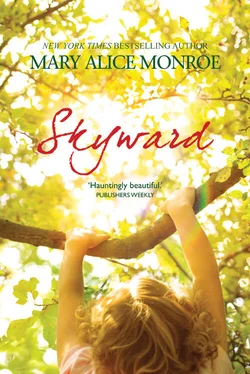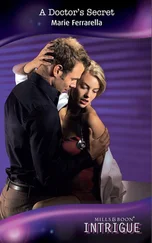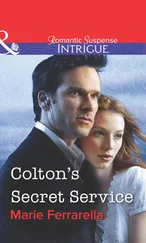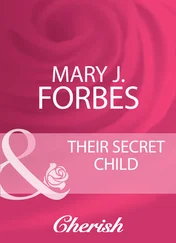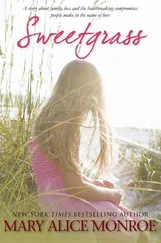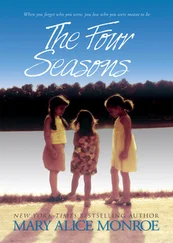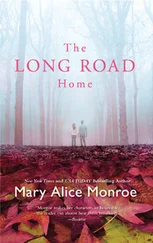when they suddenly turn
and flash their snowy undersides
in one bright act
of collected caring consciousness.
They must have heard a warning
in the lost language
of the river wind.
But the silent merlin—
in pursuit
disarmed, confused, and angry—
cackles at his lazy gods.
I see the breath
of another god, moving
beneath still wings
of the osprey and the eagle
in flight. I see
countless angels, rising from the river
with open hands
and upturned palms
to hold the wings in place
as the animals glide over
this sanctuary
and pull the sky
back into the universe.
—Marjory Wentworth
“Fa ebeeting wha dey een wi, hunnuh kin tun Skyward an’ kno’.” (For everything that’s in us, you can turn Skyward and know.)
—Queen Quet, Chieftess of the Gullah/Geechee Nation
The character of Lijah in this story was inspired by the Gullah tradition of the African-American oral historians (griots). The Gullah language is as rich and complex as the culture, and I was fortunate to have the guidance of Queen Quet of the Gullah/Geechee Nation in writing Lijah’s dialogue. However, I have taken the liberty of making substitutions so that the reader would more readily understand the text. Thus, while the dialogue is not pure Gullah, I've done my best to convey the unique qualities and rhythm of this significant Lowcountry language.
Chapter One
Chapter Two
Chapter Three
Chapter Four
Chapter Five
Chapter Six
Chapter Seven
Chapter Eight
Chapter Nine
Chapter Ten
Chapter Eleven
Chapter Twelve
Chapter Thirteen
Chapter Fourteen
Chapter Fifteen
Chapter Sixteen
Chapter Seventeen
Chapter Eighteen
Chapter Nineteen
Chapter Twenty
Chapter Twenty-One
Chapter Twenty-Two
Chapter Twenty-Three
Chapter Twenty-Four
Epilogue
Birds of Prey(also known as raptors) have characteristics that distinguish them from other birds. A bird of prey has a sharp, hooked beak for tearing food, sharp, curved talons, powerful feet for killing its prey and binocular vision. Thirty-eight species of raptors are found in the geographic limits of the United States and Canada. These species are divided into categories: buteos, accipiters, falcons, harriers, kites, eagles, ospreys and owls.
A brisk, wintry wind whistled along the South Carolina coast. It rattled the ice-tipped, yellowed spartina grass and rolled a thick, steely gray fog in from the sea. The old black man paused in his walk and cocked his ear toward the sky. He heard the whispers of change in the wind. Hunching his shoulders, he turned the collar of his threadbare woolen jacket high up to the brim of his fedora, then dug his hands deep into his pockets. He resumed walking, but he kept his eyes skyward.
The old man had walked nearly half a mile when he heard a high, plaintive whistle over the wind’s song. He stopped abruptly, rigid with expectation, staring out at the heavy shroud that hovered over the wetlands. It was a still morning; the pale night moon lingered in the dusty sky. Suddenly, a magnificent white-crested eagle broke through the mist. Its broad, plank-straight wings stretched wide as it soared over the water.
“There you be!” he muttered with deep satisfaction. Bringing his large, gnarled hands to cup his mouth, he whistled sharp and clear, mimicking the birdcall.
The bald eagle circled wide, flapping its powerful wings with a majesty reserved for royalty. The great bird took a lap around the marsh before deigning to return the call.
The effect was not lost on the old man. Heartened, he rushed his hands to his mouth and whistled again, louder and more insistently. This time, the eagle banked, then flew unwaveringly toward him.
This was the moment Harris Henderson relished. He squinted and let his gaze slowly traverse the wide, open meadow encircled by tall, leggy pines. The grasses were crisp and the ground was hard with the early morning frost. In only one day’s time, winter had blustered into the Lowcountry, plummeting temperatures from balmy to freezing. He took a long, deep breath, feeling the moist chill go straight to his lungs. The morning air carried the scent of burning wood—cedar, he thought—so strong he could almost taste it.
Turning his head, he gazed upon the sleek red-tailed hawk held firm against his chest by his thick leather gloves. Maggie Mims, a robust woman with hair almost the same color red as the hawk’s tail, looked up at him with eyes sparkling with excitement.
She gave a curt nod.
Harris moved his gloved hands so that his left wrapped around the hawk’s wings and the right maintained a firm hold of the hawk’s feet. Instantly, the hawk’s dark gaze sharpened, her mouth opened and she jerked her wings hard for freedom.
“So, you’re eager to be off,” he said in a low voice.
He waited patiently for the bird to calm itself, all the while looking on with admiration. She was a beautiful specimen, creamy breasted with a dark bellyband and the brick-red tail feathers that gave the species its name. Red-taileds were superb hunters, “the black warriors” J.J. Audubon had called them. It was hard to believe, looking at her sleek, healthy form, that she’d been brought into the clinic with gunshot wounds a mere two months earlier. “Well, it won’t be long now.”
The bird cocked its head at the sound of his voice, glaring, ferocious—the right attitude for survival. Every instinct in its body was on alert for flight. Harris could feel the bird’s anticipation in his own veins.
In this brief moment before flight, Harris sought to merge spirits with the bird. He’d read stories of shamans who practiced this ancient art, myths of Indians whose spirits soared with eagles, tales that he’d heard spoken of only in passing or in jest. Though he’d tell this to no one, deep down he’d always believed that at the core of legends and myths lay a kernel of truth. There were individuals who communicated at some visceral level with birds. He knew it. Witnessed it.
And it was his private pain that he was not one of them. Although highly skilled, he didn’t possess the rare instinct—the gift—of connection. The art of truly flying the birds.
The closest he came to it was at liftoff. The seconds when the bird’s wings stretched out and he heard the whup-whup of their flapping and felt the quick fluttering of air against his cheek as the bird flew fearlessly into the wind. At that stolen moment in time he caught an exhilarating glimpse of what it might be like to fly, to feel the lift, then the air glide over him like water.
“Ready?” asked Maggie.
Sensing freedom at hand, the red-tailed tightened its talons on his arm. The brisk wind gusted, riffling the feathers on its head. She didn’t flinch. Her eyes were focused. A faint stream of breath clouded the air like steam as her chest rose and fell. The moment had come.
“Okay, my beauty,” he said softly to the hawk. “Let’s send you home.”
With a lift of his arm, he let his hands go. Instantly the talons released their grip. Wings fluttered, stirring the air. Harris released a sigh as the hawk took flight.
Up, up, the red-tailed climbed. Harris tracked the bird, assessing her strength and looking for any tipping, which would indicate the broken wing hadn’t completely healed. The margin for survival was very slim in the wild. A raptor had to be one hundred percent to successfully hunt. There was nothing tentative about this bird’s flying, however, and Harris felt a bone-deep satisfaction that their work at the rehabilitation center had been successful.
Читать дальше
